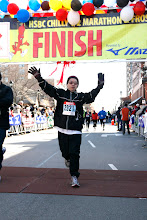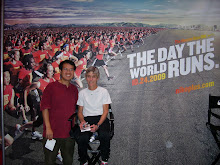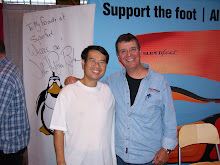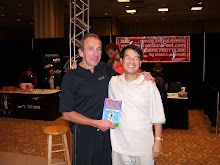Tomorrow is Family Day so it's a day off :-) Rest day, of course! After the freezing rain today, we're supposed to get 20 mm of rain, with a temperature of 5C. More showers tomorrow, again with 5C high. That's welcomed news to me as the snow will melt. Yeah!
Last night, I renewed my 1-year subscription to Runner's World. I have 1 more issue of the magazine to re-read (the April 2007 issue that I bought at the bookstore) and then I will go through my copies of the Running Room's magazine. It's nice to read the articles a second time. Here's some highlights from the Runner's World:
- March 2008 "Running Through the Ages" (pp. 61-77): 10s Decade of Innocence; 20s Decade of Invincibility; 30s Decade of the Balancing Act; 40s Decade of New Beginnings; 50s Decade of Freedom; 60s Decade of Hanging Tough; 70s and 80s Decade of Going and Going. "As you age, your mileage, pace, and motivations may change. But the soul of a runner remains" (Don Kardong)
- July 2007 (pp. 29-32): Rajime Nishi has run 496 marathons; an "ecomarathoner" to find 'harmony' with his surroundings and environment; "worst" marathon time 3:45, best 10:32; judges quality of marathon by number of photos he takes; web site www.ecomarathon.org; "Running is my passport. A smile is my visa."
- July 2007 (p. 40): "Fact or fiction: 'Real runners don't walk'": "If this were true, then all the athletes who completed in teh 1896 Olympic Marathon in Athens would not be considered real runners...My surveys have shown an average time improvement in the marathon of more than 13 minutes when using walk breaks versus running continuously. Walking doesn't 'disqualify' you from being a real runner - it can actually make you a better runner."
- July 2007 (p. 42): "Is it possible to run too slowly on easy days?": "It is...while running too slowly still contributes to overall endurance, consistenly running at a pace that puts your intensity below 65 percent of your target heart rate does little to boost cardiovascular fitness. Plus your legs take more of a beating because your muscles 'brake' more when you run slowly."
- July 2007 (p. 54): Patellofemoral Pain Syndrome (i.e., Runner's Knee) - "stress of running can cause irritation where the kneecap (patella) rests on the thighbone...cause can be traced back to poorly conditioned quadriceps and tight hamstrings. Weak quads aren't able to supprt the patella, leading it to track out of alignment, and inflexible hamstrings can put pressure on the knee...www.runnersworld.com/whartons (for strnthening and stretching)
- July 2007 (p. 60): "I eat fruit, but rarely vegetables. Am I missing out on nutrients?": "Yes...your goal should be to eat about three cups of vegetables and 2 1/2 dups of fruit every day. Your fruit quota provides plenty of vitamin C, potassium, and water-soluble fibre (the type that lowers cholesterol), plus a host of disease fighting compoundds...vegetables help ensure you get enought insoluble fiber (the type that keeps you 'regular'), folate, and magnesium."
- July 2007 (p. 67-69): "What's Your Ideal Weight?": "Aerobic fitness is a powerful predictor of longevity...lose fat, not muscle"; lose 2 pounds, improve 5K by 12.4 s, 10K by 25 s, half marathon by 52 s, marathon by 1 m, 45s; lose 5 pounds, improve 5K by 31 s, 10K by 1 m 2 s, half marathon 2 m 11 s, marathon 4 m, 22 s; lose 10 pounds, improve 5K by 1 m 2 s, 10K by 2 m 4 s, half marathon 4 m 22 s, marathon 8 m, 44 s (as long as BMI > 18.5)
- July 2007 (p. 76): "Half the battle of marathon training isn't the running itself, it's finding the resolve to run - day after day...tell youself you can have something you want, as long as you complete your workout first...that may mean getting a message, buying a new pair of shoes, going out to dinner, or just indulging in a bowl of ice cream."
- June 2007 (p. 46): "Why does it hurt so much to walk downstairs the day after a half or full marathon?" - "The significant pounding of a long race produces microtears and swelling in the leg muscles. The pain intensifies when walking downstairs (or hills) because an eccentric contraction (a muscle lengthening, in this case the quad) requires more force. Soreness is inevitable, but you can minimize it and aid muscle recovery by walking for at least 10 minutes after the race to promote blood flow and by replenishing carbohydrates and protein during the 24 hours after the race."
- June 2007 (p. 59-60): Yogurt Culture Clash: "A single serving of yougurt can pack alarming amounts of sugar and saturated fat...pick yogurts with no more than 30 grams of sugar per six ounce serving...it has no more than 1.5 grams of saturated fat per six-ounce seriving...look for the 'Live and Active Cultures' seal, which ensures that the product had at least 100 million living bacteria per gram when it was packaged...at least 20 percent of your daily calcium; 300 milligrams of potassium; no more than 180 calories."
- June 2007 (p. 62): Men: "A man logging 25 to 30 miles per week needs about 9 to 21 calories per pound of body weight, or 3200 calories per day for a 170-pound runner; eat 10 to 12 servings of fruits and vegetables daily with 10 to 12 servings of grains to help you meet your higher fiber needs (38 grams per day); at least 4 protein servings each day, such as 3 ounces of grilled fish or chicken; drink calcium-fortified juices to get 1000 to 1300 milligrams of calcium per day; eat about 8 milligrams of iron"





























